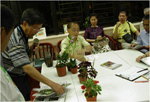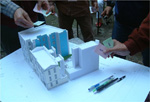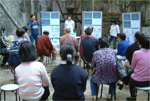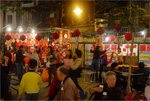|
Day Three: Designing Social Participatory System Chris
Law Presentation The presentation was on the use of participatory design method on design brief formulation, design process, consensus building on urban planning and development. The experience in Hong Kong and Mainland China shows that it is possible to utilize participatory process aiming to improve understanding, communication, and public acceptance on landscape, conservation, building and urban development. Chris Law first reviewed the situation of urban development in Hong Kong. He stated that there was no local government in Hong Kong. Almost all of the decisions concerning development are made on the city level. This situation makes the developing policy to be inclining toward the economic prospect; and induces much conflict at certain old neighborhoods with development outlook. Wanchai is one of the typical scenarios. Law introduced several projects he and The Oval Partnership did in Wanchai. These experiences illustrated that participatory design method could be a design process that arouses the community with a new awareness when facing this situation. He used the Luen Fat Street project to illustrate the process and effect of this method. Law cooperated with the St James' Settlement to turn a wasteland in Wanchai to a communal space, a park. The community was involved throughout the whole process, from the idea sketching to construction, and also the management of the park. Law and his team hold many workshops for the residents to participate. They designed visualizing tools and methods for the residents to involve in the design. So the residents were no longer neglected, Law took one more step than to merely collect opinions from the community, but to encourage the residents to become part of the design team. The park becomes a place for holding communal activities now. Other examples like the Lee Tung Street project and The Blue House in Hong Kong also shows that this design process could be a tool for directing the opinions of the community to the government in a consolidated proposal. Law concluded the experience and discerned a twofold effect of the participatory design method. First of all, it is a very useful tool for the professionals to gain a new perspective of planning and design; and the more important aspect lies on its effect on the community. Being involved in the design process of the living environment, the sense of belonging was built up at the same time. This method opens up a platform for the community to discuss some urban issues such as development and conservation. It also helps to generate concern and energy for self-activated and sustainable involvement in shaping the neighborhood.
Biography Chris Law is the Founding Director of the Oval partnership. He is also a Director of INTEGER China Ltd, an organisation which promotes intelligent and green housing in China. Chris was educated at Stonyhurst College in Lancashire in the UK, and studied Architecture at the University College London. Over the years Chris has received many awards including Architects of the Year Award and the Outstanding Young Person Award. He is currently the Chairman of the Family Welfare Society, a charity with a staff of 600, and Chairman of the Centre for Community Renewal at St. James' Settlement. Married with two children, Chris spends his leisure hours collecting and testing recipies. Chris and Oval Partnership has been driving and executing Sustainable Lifestyle projects in the Asia Pacific region to ensure a continuous growth in its economic and social capital. These include heritage projects and testing methodology for community participation in architecture and planning. The Partnership conducts design-fests, consensus building workshops, surveys, street meetings and evaluations for community projects and projects of sensitive nature. Recent cases in Hong Kong include Luen Fat Street Re-creation Space and the residents' counterproposal of Lee Tung Street re-development, both against the backdrop of the old Wanchai re-generation. Website: www.ovalpartnership.com |
| X Close | |





